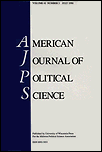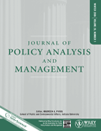Research
Self-regulatory Institutions for Solving Environmental Problems: Perspectives and Contributions from the Management Literature
The idea of tools such as certification as a means of managing key issues, often addressed by policy-makers with regulation and legislation, is examined in ‘Self-regulatory Institutions for Solving Environmental Problems: Perspectives and Contributions from the Management Literature‘ (King, Toffel, 2007) In particular, the use of ISO 14001 certification as a ‘self-regulatory institution’ is examined.
The report suggests that the creation of a robust ‘self-regulatory institution’, such as consensus-based standards (such as ISO), certified by third-party certification who themselves are accredited by accreditation bodies, can deliver significant environmental benefits. The report’s conclusion presents a very optimistic view of systems such as ISO 14001, ‘For readers interested in practical solutions to environmental problems, the research presented in this chapter suggests that self-regulation should be taken seriously.
Many firms have voted with their feet and joined prominent examples of self-regulatory institutions. Managers in these firms appear to believe that participating in these institutions will help them solve real problems. Initial empirical research suggests that some of these institutions might, indeed, help firms reduce market inefficiencies. Some appear to reduce asymmetries in information, others to facilitate coordinated investment in solutions to common problems. In the aggregate, the research reviewed reveals a world not of inevitable tragedy but of possibility’. Backed up by a range of empirical research, the report presents a compelling case for considering systems such as ISO 14001 certification as a tool to make a real impact on environmental performance.
Authors
King, A., Tuck School of Business, Dartmouth College; Toffel, M., Harvard Business School
Citation
King, A., Toffel, M., (2007), ‘Self-regulatory Institutions for Solving Environmental Problems: Perspectives and Contributions from the Management Literature‘




